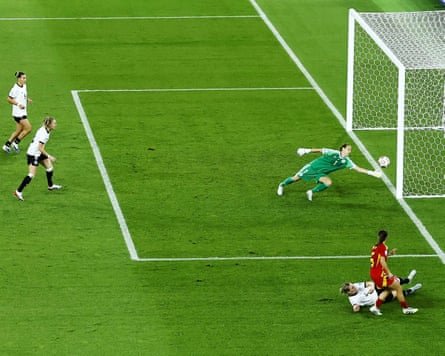Aitana Bonmati nearly missed the 2025 European Championship due to a bout with viral meningitis the week before the tournament began. But on Wednesday, the two-time Ballon d’Or winner found a late goal to lift Spain to their first appearance in a Euros final. They will face a familiar opponent in England — the team Spain beat in the 2023 World Cup final.
In a record fourth match that went to extra time this tournament, Spain needed a bit of magic from their star player to get past eight-time tournament winners Germany. The German side nearly ended the game in regular time with a pair of back-to-back shots in the 94th minute, but Spain goalkeeper Cata Coll made two acrobatic saves to keep the score level going into extra time.
Spain also finally broke their drought against Germany, a team they hadn’t beaten in the last eight meetings.
Despite Germany holding Spain scoreless through 90 minutes, something no other team at Euro 2025 could do, they failed to capitalise on multiple chances at the other end. Germany’s first of three shots on target came after the hour mark, despite multiple chances throughout the game.
Cerys Jones and Tamerra Griffin analyse the main talking points, setting up yet another final between Spain and England.
Bonmati to the rescue
Bonmati should not have scored that goal. Given how airtight Germany’s defense has been the whole game; how sharp Ann Katrin-Berger’s coverage of the goal; how underwhelming Spain have been on the attack with lofty crosses and half-hearted shots; how likely this game was to end with yet another set of penalties; and how Bonmati might still be recovering from viral meningitis; it simply did not seem possible by any stretch of the imagination.
But this is why Bonmati is a two-time Ballon d’Or winner. When the pressure is high and the chances slim, she transcends imagination and executes.

Bonmati’s extra time goal lift Spain to the Euros final (Sebastien Bozon/AFP via Getty Images)
She had fist-slamming frustrations throughout a game that saw Spain uncharacteristically frustrated over a much longer period than they’re used to against a steely Germany, but still Bonmati decided to do a dummy run that allowed her to slip past Rebecca Knaak before firing a low, driven, near-post shot at such an acute angle, you could hardly blame Berger for assuming she wouldn’t bother exploiting it. The shot was simply avant-garde in its brilliance. We will never know whether it was purposeful or a misdirected cross, but the way Bonmati pointed to her head during her celebrations suggests it just might have been.
Tamerra Griffin
Germany were their own worst enemy, again
Germany reached the final four despite doing their level best to put obstacles in their own path. Against Spain, they again have themselves to blame for their defeat.
Nobody has managed to keep a clean sheet against this Spanish side with their vast reserves of goalscorers and creators. No matter how dogged your defence, they will eventually score by hook or by crook — so opponents’ only real hope is to outscore them by exploiting their high line and being clinical in front of goal.
Germany became the latest side to fail to pull that off. Despite holding Spain scoreless for more than 100 minutes, it was through their own wayward finishing and lack of an incisive final action that they found defeat.

Germany held Spain for more than 100 minutes (Eddie Keogh/Getty Images)
Most teams have not even got as far as creating the opportunities that Germany carved out against Spain, so they deserve credit for that, but will be bitterly disappointed in their lack of end product.
Giovanna Hoffman had a particularly infuriating few moments in the first half, snatching at Sara Dabritz’s promising cross in the 28th minute and rolling a shot wide from Carlotta Wamser’s sumptuous curled pass in the 30th. She was offside for the latter, which she might well have been relieved by after failing to convert when one-on-one with Cata Coll. Before that, in the eighth minute, Klara Buhl had missed a golden opportunity to put Germany ahead when she fired wide after a perfectly timed run onto Berger’s long free kick. The ending of stoppage time summed it up: they had four shots, two of which were superbly saved by Coll and two of which were comfortably off target.
They followed the blueprint for beating Spain up until the final step. They attacked well on the counter, exploited their high line, created good chances from the wings, and did so with only 33 per cent of possession – but let themselves down in front of goal. They had ample chances to take the lead before Bonmati eventually scored deep into extra time.
Having suffered avoidable and obvious red cards for Carlotta Wamser and Kathrin Hendrich against Sweden and France, they caused their own downfall with attacking rather than defensive errors in the semi-final.
Cerys Jones

Germany goalkeeper Ann-Katrin Berger and Spain forward Esther Gonzalez are teammates at Gotham FC in NWSL (Alexander Hassenstein/Getty Images)
Familiar foes among two Gotham FC players
Some of the striker-keeper duels between Spanish striker and Euros golden boot leader Esther Gonzalez and German goalkeeper Ann-Katrin Berger could have ended differently had Berger not been so deeply familiar with her goal-hungry opponent.
The two have been holding down both ends of the fort for Gotham FC in the National Women’s Soccer League (NSWL). Esther, in this tournament and her club’s league, leads the scoring (four goals at the Euros, 10 in the NWSL), while Berger was voted goalkeeper of the year last season and regularly dazzles with highlight-reel-calibre saves, even before the one that nobody can stop talking about in the quarter-final against France.
That’s the kind of edge a keeper needs against a prolific, confident, and in-form striker like Esther, whose threat is at least twofold: she can score with both feet and her head; and her movement off the ball is as cerebral as it is dizzying for a defender to track.
Tamerra Griffin
A rematch waiting in the final
The final against England is Spain’s chance to lay an unequivocal claim to the title of best team in Europe.
They are already familiar with England as opponents on the biggest stage, having beaten them in the final of the 2023 World Cup. Much about England remains the same: familiar faces like Ella Toone, Alessia Russo, Lucy Bronze, and Georgia Stanway were stalwarts of that final, and their attacking identity has stayed similar. However, there are new variables: Spain were not facing England’s likely front three, crucially including an in-form Lauren James, and England did not enter that final as, arguably, underdogs.

From World Cups to Nations Leagues, Spain and England know each other well (Judit Cartiel / Getty Images)
Sarina Wiegman’s team have made life incredibly difficult for themselves at Euro 2025, falling to a concerning opening defeat against France in the group stage and twice needing Michelle Agyemang’s late equalisers to drag them through the knockouts. Several times they have looked beaten, and several times they have bounced back. That puts a different complexion on this final to Spain’s win in Australia in 2023, when it was Spain whose build-up had not gone smoothly and England who were entering on the back of a major tournament win. Those roles are now reversed.
England are beatable. France have done it once this tournament, and Sweden and Italy came remarkably close. But in spite of the noisy buildup, the early defeat, the scrappy knockout performances, here are England in a third consecutive major final. Spain face a side with proven winning credentials, but an underdog mentality – a combination which, if they cannot break England’s spirit early, could be lethal.
Cerys Jones
(Top photo: Miguel Medina/AFP via Getty Images)








